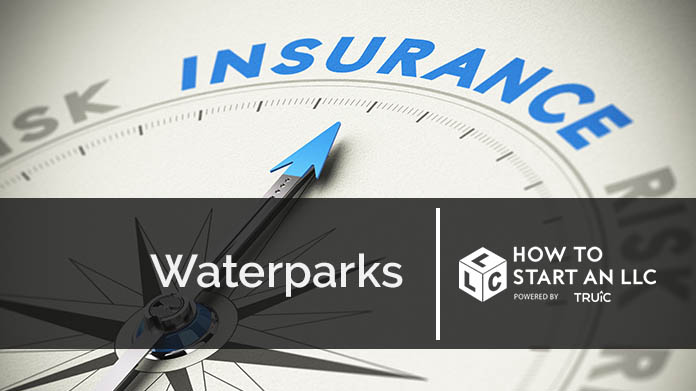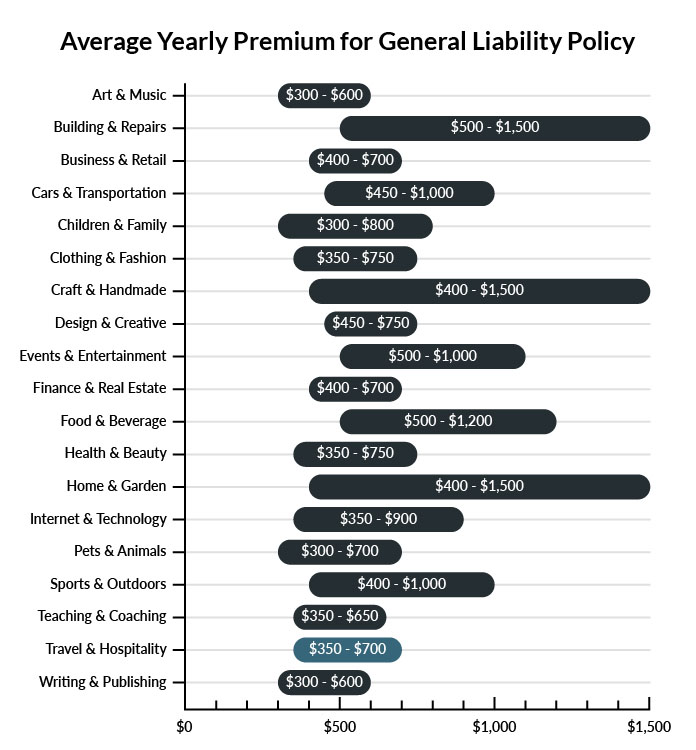Waterpark Business Insurance
Getting insurance for your waterpark business is essential.
This is because waterpark businesses need to be protected from a variety of different risks, such as bodily injury claims, property damage, and employment law-related disputes.
For example, a customer may accidentally get injured while using one of your park’s rides (or one of your park employees may injure themselves while operating a ride and require time off).
We’ll help you find the most personalized and affordable coverage for your unique business.

Recommended: Ergo Next Insurance is dedicated to matching small businesses with the right policy at the best price.
Best Insurance for a Waterpark Business
General liability insurance is — generally speaking — one of the most important insurance policies for waterpark businesses.
Some of the risks general liability insurance covers are:
- Bodily injury
- Property damage
- Medical payments
- Legal defense and judgment
- Personal and advertising injury
Having said that, your waterpark business might also benefit from other types of policies depending on its unique risks and needs. This is because a general liability policy may not be enough to cover it from all potential liability.
Additional coverage policies that you may want to consider include:
- Commercial property — Will help you repair and/or replace your waterpark’s property and equipment in the event that it gets damaged or stolen.
- Workers’ compensation — Will protect you against employee-related disputes and liability, such as personal injuries or wrongful terminations.
- Business income — Will replace part of your lost income in the event that your park is required to close temporarily.
You will also need to find the right type of insurer for your business. As of 2026, there are two options available:
- Traditional brick-and-mortar insurers (e.g., CNA, Nationwide, etc.).
- Online insurers (e.g., Tivly, Ergo Next Insurance, etc.).
We recommend going with an online insurer as a small business due to the fact that’s the most price-efficient option.
Let’s Find the Coverage You Need
The best insurers design exactly the coverage you need at the most affordable price.
Cost of General Liability Insurance
The average waterpark in America spends between $350-$700 per year for $1 million in general liability coverage.
Compare the average cost of general liability insurance for a waterpark business to other professional industries using the graph below.
Several factors will determine the price of your policy. These include your:
- Location
- Deductible
- Number of employees
- Per-occurrence limit
- General aggregate limit
You may be able to acquire general liability insurance at a discounted rate by purchasing it as part of a business owner’s policy (BOP) rather than as a standalone policy.
A BOP is a more comprehensive solution that includes multiple forms of coverage, such as business interruption and property insurance.

Find the Best Rate
Discover the best coverage at the lowest rate in our low-cost business insurance review.
Common Situations That General Liability Insurance May Cover for a Waterpark Business
Example 1: While climbing the stairs for a waterslide, a guest slips and falls down several steps. General liability insurance would likely cover any injuries they sustained during the incident.
Example 2: A ride malfunction results in severe injuries for several guests who were on the ride. Even if responsibility is ultimately attributed to the ride manufacturer, your waterpark may be named in a liability lawsuit. General liability insurance would likely cover the legal costs.
Example 3: An advertising campaign claims that your waterpark has more rides than are operational for the summer. Several guests who came partly because of the number of rides file a joint false advertising lawsuit. The suit would probably be covered by general liability insurance.
Other Types of Coverage Waterpark Businesses Need
While general liability is the most important type of insurance to have, there are several other forms of coverage you should be aware of. Below are some of the most common types of coverage:
Commercial Property Insurance
Waterparks need commercial property insurance for their buildings, rides, games, and other attractions. Property insurance can protect multiple types of physical assets, including buildings, equipment, inventory, and supplies.
Most water parks need robust commercial property insurance because they have many expensive features to protect. Make sure your policy’s limits at least meet the rebuilding cost of all your park’s buildings, rides, and attractions.
Commercial property insurance is generally included in a business owner’s policy (BOP).
Workers’ Compensation Insurance
Businesses that have employees typically need to protect them with workers’ compensation insurance. The coverage protects against both work-related injuries and illnesses, and it’s usually required by state law if your business has employees.
Commercial Umbrella Insurance
There is an upper limit to the amount of liability protection that primary insurance policies offer. Commercial umbrella insurance provides additional liability coverage, often in the millions of dollars.
Commercial umbrella insurance is especially important for waterparks because a single incident could result in one or more extremely expensive lawsuits. If someone drowns or multiple people are injured at once, the resulting liability costs could easily exceed a primary policy’s limits.
Commercial umbrella insurance is included in certain package policies and is also available on its own.
Business Interruption Insurance
Recovering from a disaster can take a lot of time when you need to rebuild attractions, and bills don’t necessarily stop coming due during that time. Business interruption insurance can provide supplemental revenue while your business recovers from a disaster.
Without ticket sales providing revenue following a disaster, the supplemental payments from business interruption insurance could potentially save your waterpark from bankruptcy. For many businesses that need to rebuild, this insurance is the difference between closing permanently and eventually reopening.
Business interruption insurance is included in BOPs.
Crime Insurance
Commercial property insurance generally protects against third-party theft, but it often excludes stealing by employees. If you’d like protection against employee theft, consider getting crime insurance. The insurance offers coverage for a wide array of illegal and dishonest employee actions.
Many water parks decide to get crime insurance because multiple temporary and part-time employees handle money, which gives them opportunities to steal. Even a single employee can steal a significant amount if they have the right opportunity.
Crime insurance is included in certain package policies and is also available on its own.
Additional Steps To Protect Your Business
Although it’s easy (and essential) to invest in business insurance, it shouldn’t be your only defense.
Here are several things you can do to better protect your waterpark business:
- Use legally robust contracts and other business documents. (We offer free templates for some of the most common legal forms.)
- Set up an LLC or corporation to protect your personal assets. (Visit our step-by-step guides to learn how to form an LLC or corporation in your state.)
- Stay up to date with business licensing.
- Maintain your corporate veil.
Waterpark Business Insurance FAQ
Yes, absolutely. You will need to first get a quote from an online business insurance provider like Ergo Next Insurance. Ergo Next allows you to then purchase a policy immediately and your coverage will be active within 48 hours.
A typical business owner’s policy includes general liability, business interruption, and commercial property insurance. However, BOPs are often customizable, so your agent may recommend adding professional liability, commercial auto, or other types of coverage to your package depending on your company’s needs.
“Business insurance” is a generic term used to describe many different types of coverage a business may need. General liability insurance, on the other hand, is a specific type of coverage that business owners need to protect their assets.
Getting business insurance before you begin operating can be a great way of ensuring that you are protected before you begin interacting with park guests. This is because you have no way of knowing exactly when liability will arise, and want to avoid a situation where you need to rely on your coverage but have not yet purchased it.
Not necessarily. Certain exceptions may be written directly into your waterpark business insurance policy, and some perils may be entirely uninsurable.
Yes, an LLC is meant to create a legal barrier between your business and your personal assets and credit. If you haven’t formed an LLC yet, use our Form an LLC guide to get started.
An LLC doesn’t protect your business assets from lawsuits and liability– that’s where business insurance comes in. Business insurance helps protect your business from liability and risk.